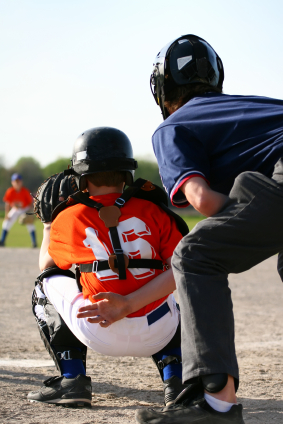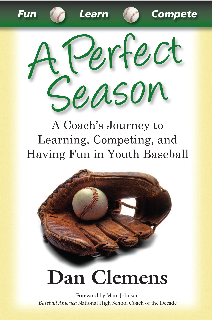In one of my son's games an umpire botched a call on the overthrow rule. Instead of having the other team's player stop at third, he awarded the kid home, which tied the game in the fifth inning. We had made several mistakes on the play, but I didn't need the umpire compounding the blunder.

I was quick to protest, calmly asking for time and jogging out to home plate to discuss the situation with the ump.
There wasn't any gray area. But after a brief exchange, I soon realized that that the umpire was foggy on the rules and hadn't been paying attention. He wasn't aware that it mattered where the runners were at the time of the throw - the key piece of information to get the call right. But he wasn't budging on his call.
I saw the play. I knew the rule. I was right.
Unfortunately, that wasn't enough.
Being right or being effective
Often when dealing with umpires, parents, and kids (not to mention bosses and co-workers!), being right is only a piece of what's important. We have to balance correctness with our larger goals: what are we trying to accomplish in this game, this season, with these kids and parents . . . what experience do we want them to have?
It came down to a choice: I could be right or I could be effective.
Injustice on the baseball field is painful, especially when you have the rules of the game on your side. Those of us who know the game appreciate that it is steeped in rules, statistics and logical structure - it's something we try to teach the kids ("If there is one out and a runner on first, then you . . .").
So producing the rulebook and reading the passage about overthrows to the umpire, and, in Perry-Mason-like-fashion, showing the locations of the base runners, appeals to the trial lawyer in all of us. The scene would win points in a Hollywood film, and it strokes our egos!
But the question remains: is taking such an approach the best for the kids? Would the focus be on me or on the kids? Would it be consistent with what I think should be the objective for any coach: to have his team have fun, learn, and be competitive? Would I be modeling the behaviors and life lessons I wanted my players to learn over the course of a season?
As we were approaching the time limit for the game, I realized that a protracted argument would use valuable minutes that would be better spent extending the game to another inning to give us both the chance to win the game outright, and enable my players to enjoy another inning of the game they loved.
React or respond
I had a choice to make. React to the injustice and argue my cause. Or respond by accepting the call, and rallying the kids to focus on our baseball challenge: how do we get out of this inning and get our bats going in the top of the sixth?
React vs. respond. It's the classic choice we have to make in every situation on and off the field. A reaction is fast action on the first thing that comes to mind. It's words and action to solve the problem directly in front of us - the raw emotion, the unexpected event, the blown call.
A response, however, balances this urgency with our desired outcomes. We talk and behave in ways that help us achieve larger goals and objectives by putting the situation in front of us in proper context and perspective.
Back to my decision. I was right but the umpire showed no inclination of budging on the call. React or respond? Be right or be effective?
I chose to ... respond. And so did the kids. They let their bats do the talking, scoring four runs in the top of the sixth and eventually winning the game, 9 - 6.
Our team huddled as usual in the stands following the game and, after praising them for a great effort, I explained the play in the fifth inning. I told them I considered berating the umpire for blowing a call and not knowing the rules, but used the play to reinforce a few key points tied to my larger goals and life lessons:
- The umpire misinterpreted the rule, but sometimes you have to accept an injustice and move on. I detailed the rule and how it should have applied, so they learned it correctly.
- I asked how we could have avoided the situation in the first place (and waited for the answer that never came: if the outfielder had hit the cutoff man, there wouldn't have been an overthrow!).
- I emphasized that sometimes you can be right and still lose an argument. In other words, you have to pick your battles.
We won despite a bad call - I was proud of the kids for focusing on what they could change, not on something they couldn't.
Opportunity calls
As adults, it is critical that we realize the opportunity every moment affords us, the "teachable moments." As a coach and parent, we always have a choice in how we act and what we say.
As the game ended I made a point to shake the umpire's hand and thank him for the two hours he put in behind the plate. With a smile on my face I explained that I was going to go home and re-read the overthrow rule.
He smiled and said, "That's not a bad idea coach. I'll do the same."
I quickly seized the moment and said that, if I saw him at a future game, I hoped we could compare notes on what we learned. I hoped this non-confrontational approach would spur him to read all the rules again so that he would be a better umpire for all kids and coaches he comes in contact with for the rest of the season. We'll see.
You can be right or you can be effective. Which will you choose?
 Dan Clemens is the author of A Perfect Season: A Coach's Journey to Learning, Competing, and Having Fun in Youth Baseball (Quiet Path 2010). It is available at Amazon.com, Barnes and Noble and other bookstores.
Dan Clemens is the author of A Perfect Season: A Coach's Journey to Learning, Competing, and Having Fun in Youth Baseball (Quiet Path 2010). It is available at Amazon.com, Barnes and Noble and other bookstores.
A leadership and communications consultant, he's been a youth coach for 9 years. You can email him at Dan@CoachClemens.com.
Posted March 27, 2011








